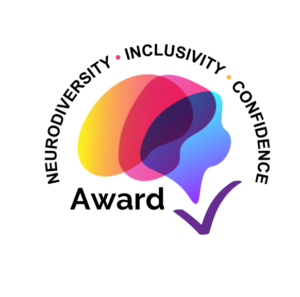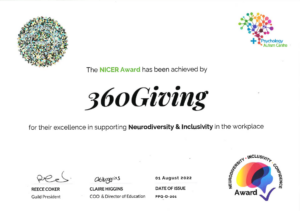Inclusion, the Neurodiversity Inclusivity Confidence Award and 360Giving’s journey

This National Inclusion Week we are proud to share our journey to achieving the Neurodiversity Inclusivity Confidence Award. In this blog, I’m sharing what we have considered and implemented in 360Giving’s inclusion journey, and what we have learnt along the way.
Where we started
When I joined 360Giving as Chief Executive in March 2020, I reviewed every organisational policy and process, and we signed up to the TechTalentCharter. Like many other organisations we developed a Diversity, Equity and Inclusion policy and developed an annual action plan to deliver it. It included all the traditional elements such as training, Board and staff diversity, recruitment processes, adjustments at events etc. We achieved many things that we had set out to implement, but there was always going to be a limit to the impact of such initiatives in a small charity with tight budgets and just five members of staff at that time.
During 2020 we also developed our values framework and embedded it into our organisation with inclusion very much at the heart of our values and approach. In 2021, we used these values to drive our approach to the development of our 2022-25 strategy, and in the process, something shifted.
Values driving approach
Instead of our values supporting and being a part of our strategy, our values drove the strategy and the process for developing it.
This was a game changer for us and we started to think about our work and priorities in different ways.
We also looked at where we could have the most impact as a small organisation (in a relatively niche part of the sector) on diversity and inclusion and agreed to focus on neurodiversity for the period of the strategy. Neurodiverse individuals, particularly people who identify as autistic, are more commonly found in data roles, so are likely to be within our staff team, programme participants and publisher contacts. Therefore, it is an area where adjustments and initiatives might have more impact. You can find out more about our intent in our neurodiversity and inclusion policy.
We recognised that an approach that prioritises individual inclusion has a benefit to inclusion and wellbeing for all – and we very deliberately looked at inclusion in the context of wellbeing together rather than with diversity where it is often positioned.
What we learnt
Here are some reflections on our journey so far that might be helpful to others:
Assessing needs
The things that people needed to be at their best weren’t always the things that we had assumed – and wellbeing was very different for different people. Some people needed help to reflect on their preferences and needs and it wasn’t always obvious to the individual. We used various exercises and tools to do this, one person also had a coach to support this process, and we developed an inclusion and wellbeing form to act as a prompt for people to consider what they might need. This is used to facilitate a discussion and is not an end in itself. It is not exhaustive and is relevant to our organisation, but we are sharing it here if it might be helpful to you. Inclusion and Wellbeing Impact Form.
While we couldn’t implement all preferences as the needs of some individuals contradicted those of others, we have implemented changes to the ways in which we work and regularly review these – and more importantly we have regular active discussions about preferences and needs. Many of the changes we made were small and free to implement, but made a big difference to some people.
Learning process
Members of the team undertook areas of independent study and shared their learning with others – there are plenty of free or very affordable options out there. For example, I completed a Level 2 Certificate in Understanding Autism through The Skills Network. With different team members looking at different areas, we collectively increased awareness and curiosity at all levels of the organisations.
We sought external perspectives to support our learning and reflection from people with different lived experiences – including where we already had the experience within the team. This reduced the burden on people internally, and meant people didn’t feel that they needed to be representative of all people with their particular identity or characteristic. This provided us with a richer understanding and an internal vocabulary to discuss differences and needs and supported people with lived experience to share more of that.
Neurodiversity Inclusivity Confidence Award
One of the organisations that we worked with was the Positive Psychology Autism Centre. This was really helpful in challenging us on what more that we could do and provided something for us to work towards with the Neurodiversity Inclusivity Confidence Award for Neurodiversity Inclusivity Confident Employers, which we were proud to be awarded last month. This wasn’t just a ‘tick box’ exercise for us. The Neurodiversity Inclusivity Confidence Award is recognition of how far we embedded inclusion in our work and our ongoing commitment.

Further development
As well as looking at our internal needs, we have also implemented changes to our services and programmes to reflect our learning, with more to come over the coming year. It was important for us to have a firm foundation and understanding internally for us to develop things further. Some of the things that we had considered early in this process were later recognised as not the right fit so it was good that we didn’t rush to implementation before we had enough understanding.
Sharing our learning
While we don’t have all the answers, we are keen to share what we have learnt so far with others. If you are making changes or perhaps are recruiting for data roles in your organisation and want to think about how you can be inclusive for the widest range of talent, we’d be happy to have an informal chat to share considerations. Feel free to contact me at director@threesixtygiving.org.
And why not work towards the Neurodiversity Inclusivity Confidence Award yourselves?
